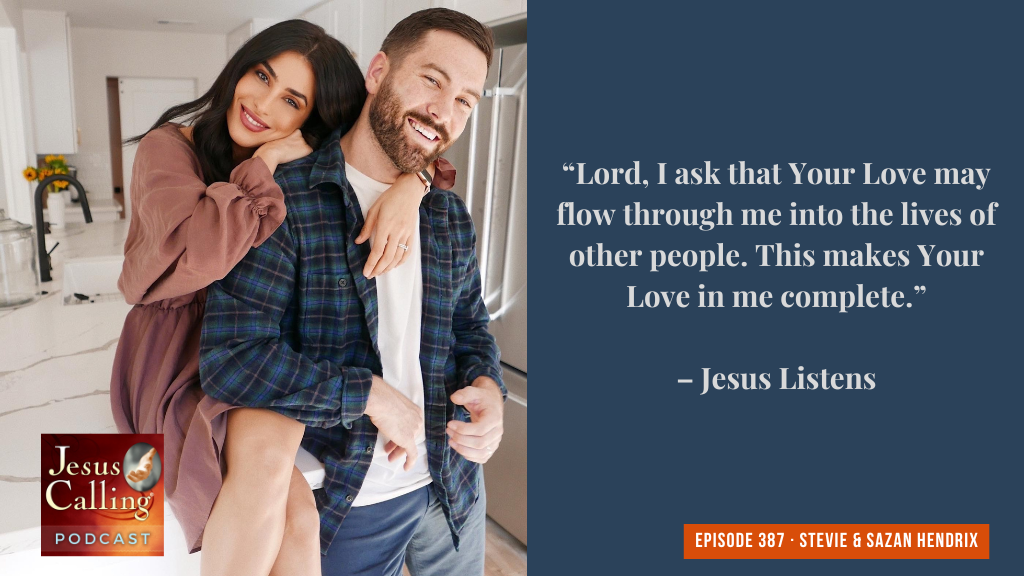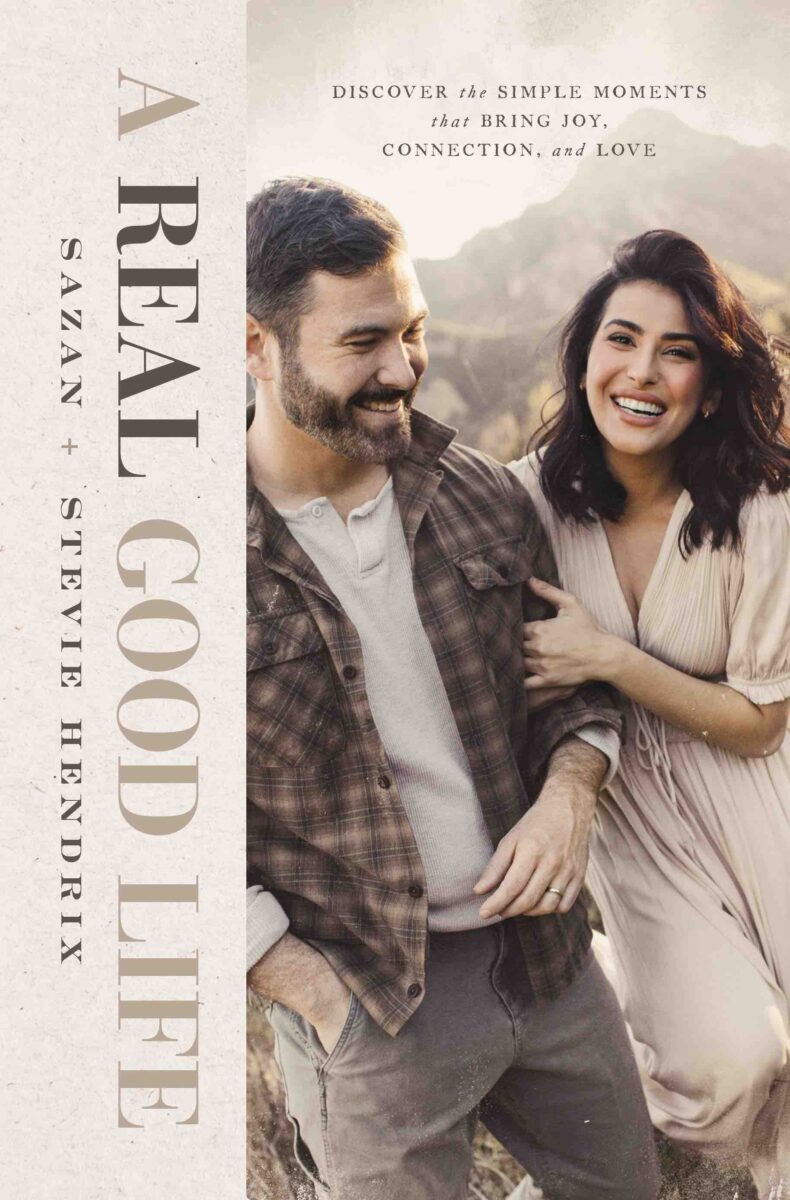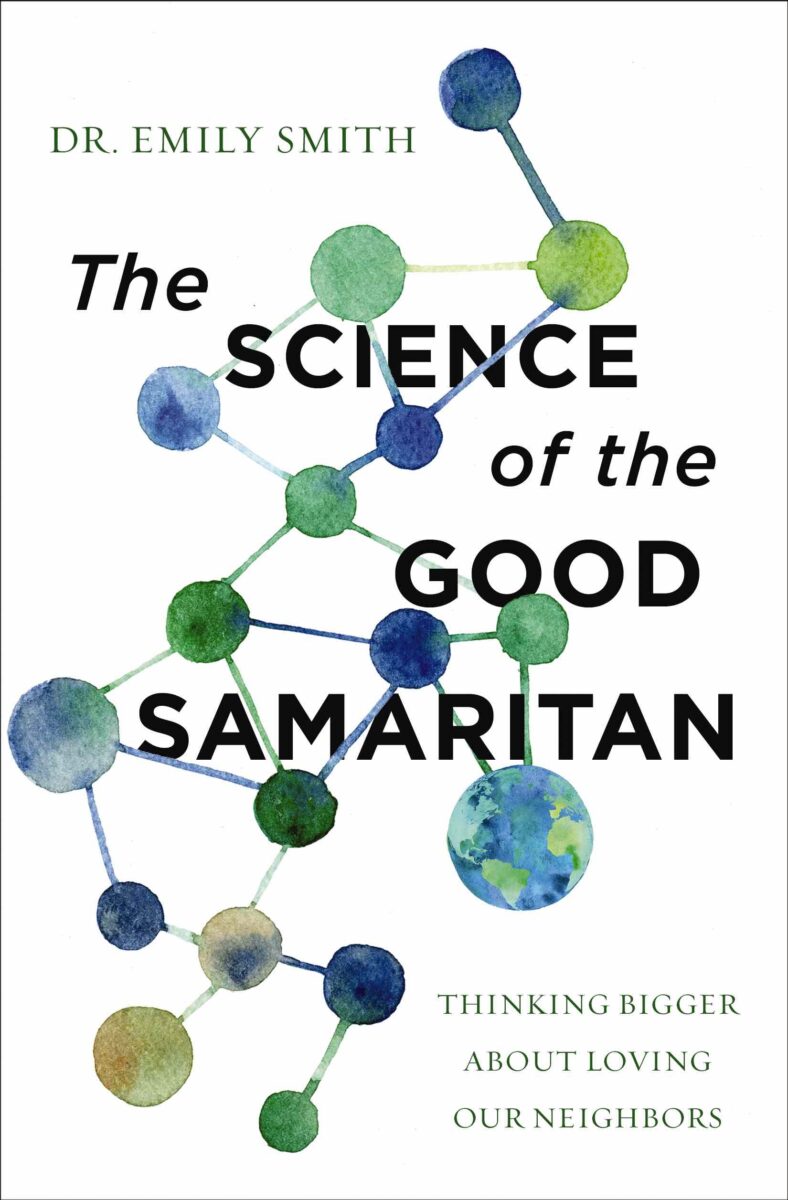Spreading Hope During The Holidays: Stevie and Sazan Hendrix & Dr. Emily Smith

Stevie Hendrix: I really believe God uses your patience, He uses your persistence and your humility to break down those walls, and I think we can see families be healed, using the holidays to do that. It’s a wonderful time.
Spreading Hope During The Holidays: Stevie and Sazan Hendrix & Dr. Emily Smith – Episode #387
Narrator: Welcome to the Jesus Calling Podcast. For so many, holidays don’t always represent a time of joy, but trigger memories of painful past trauma, or reminders of deep loss. Whether we greet the holidays with anticipation or dread, we can all be a part of helping each other heal during the holidays. Small acts of kindness—beyond traditional Christmas gifts—can have a big impact in spreading love and creating positive change, especially during a time that brings mixed emotions for so many.
Our first guests this week are digital creators Stevie and Sazan Hendrix. They share some tips about how to navigate the holidays, even when they are hard, and how to find hope even when things feel hopeless.
Stevie: I’m Stevie, and this is my wife, Sazan, and we are from Austin, Texas.
Finding Hope and Bringing Hope to Others at Christmas
Sazan: In my family, we spend Christmas every year remembering what we went through as a family that once upon a time ago.
We were all getting ready for the Christmas stuff, and suddenly we were just all very aware that my little eight year old brother at the time had all of these bruises, and it was just a little abnormal to where we went and got him checked out. My mom thought she was just going to come home that day and everything was going to be back on track, let’s get the turkey ready and all of that. It was on Christmas Eve—that day, my brother got diagnosed with leukemia, and it totally changed our family. It changed our life, but it changed, obviously, our Christmas that that holiday season.
I just remember that night and being in the hospital on Christmas Eve, you suddenly realize that, We’re not at home sitting beneath our Christmas tree, wrapping presents, watching movies. No, we’re in a hospital room with other families that are also hurting, who are also dealing with the suffering and the unknowns of a loved one being sick. And so we were all in this hospital room, gathered in this small room, and we were all just there for my little brother. And I just remember Christmas morning, the one miracle prayer that I was hoping for was like, “Please, just the one miracle, this would be the best Christmas ever if we find out [his cancer] didn’t spread, just give us that in the midst of this heartbreak,” right?
And we got that news on Christmas morning that it had not spread. We received this glorious news that gave us hope, finding hope in hopeless moments. And today, my little brother is not so little anymore. He was eight at the time, and now he’s twenty-two. And it’s just such a beautiful reminder that sometimes life happens in the midst of holidays and exciting things and all the happenings and these unexpected, chaotic things happen, but you’re still able to stop and see the good, find that hope in the hopeless moments.
“Sometimes life happens in the midst of holidays and exciting things and all the happenings and these unexpected, chaotic things happen, but you’re still able to stop and see the good, find that hope in the hopeless moments.” – Sazan Hendrix
It’s something that we saw, that we walked through on Christmas, and it’s forever changed Christmas in my family. My brother walked out of that journey. He was no longer in the hospital and getting treatments and stuff.
Because we witnessed on Christmas morning how these hospitals, these children specifically, they don’t really get a Christmas at home—now that I have kids, we’re going to go take toys to the hospital with our five year old. I want her to see that. I want her to witness that. And again, it’s not these larger than life things, it’s just these small little tokens of appreciation that you can pour into your community and it just is one little thing at a time. And what is that one thing you can do when you look around to help spread God’s kingdom and His love through that thing, you know?
“It’s not these larger than life things, it’s just these small little tokens of appreciation that you can pour into your community and it just is one little thing at a time. And what is that one thing you can do when you look around to help spread God’s kingdom and His love?” – Sazan Hendrix
Finding Peace During the Holidays
Stevie: I feel like in families, it’s so easy to get annoyed with each other. Right? Like, especially around the holidays. I don’t know, we all get territorial about certain things.
I think it’s easy to get wrapped up in the perfection of all of these events. And trying to do things perfectly and losing sight of just, Oh, this is actually about like being with one another. Right? It’s obviously about celebrating the birth of Jesus, but it’s also about being with one another. It’s about the simple moments.
My mom’s house every year, she’s either hosting Thanksgiving or Christmas, and she’s making this huge feast. And sometimes, tempers are flaring, everyone’s like, Oh, my gosh, we’ve gotta get this and it just seems to be like this big ordeal, and it kind of sucks the joy out of the moment. And I think at some point you have to get sick of it and just say, you know, “We’re not doing this anymore. We’re going to do the event, we’re going to host the dinner, but not at the cost of our peace.”

What I would encourage you to do is if it’s Jesus Calling or if it’s your Bible, or if it’s a really good book that is God-centered and God-focused, I would say put that somewhere you can see it. Put it somewhere—maybe it’s your nightstand so it’s first thing in the morning or at night, your coffee table, maybe it’s your kitchen island. Put it somewhere.
Sazan: My Jesus Calling is actually by the sink. Now, it gets a little wet sometimes and it gets a little scuffed on the pages, but the reason I do that is because I spend a lot of time around that kitchen sink doing dishes. And so when I see it there, even when I can just leave the page open throughout the day…

Stevie: Hey, even if it’s five minutes, I’m going to start my day focusing my gaze on Him. My eyes were fixated on my problems. My eyes were fixated on my circumstances and not on Him and what He was doing and His purpose and His plans for me. And so I think a lot of us live our days that way, and it’s totally unintentional, but we go throughout our days reacting to the things that are happening to us, instead of saying, God, this day is about you. How can you use me today? How can I show up for the people around me? And I think fundamentally, if we can shift our gaze from ourselves to Him, it has a huge impact on our life and how we begin to see the world.
Narrator: To learn more about Stevie and Sazan, follow them on social media, and be sure to check out their new book, A Real Good Life, at your favorite retailer.
Stay tuned to Dr. Emily Smith’s story after a brief message.
Looking For Someone To Talk To?
This episode is sponsored by BetterHelp.

We here at Jesus Calling: Stories of Faith love to bring you stories of overcoming, trusting in God to bring us to a better place, and the hope that comes through faith. Many of our guests have talked about how they’ve found peace and hope in their lives through a daily prayer practice, but also through outside sources as well, like counselors and therapists.
That’s why we’re pleased to offer something to you, our listeners, if you’re going through a season where you need a little extra help or just someone to talk to. Talking to a professional therapist is helpful for learning positive coping skills and how to set boundaries. It empowers you to be your best self, no matter what you’ve been through. If you think you might benefit from therapy, give BetterHelp a try. It’s entirely online, designed to be convenient and suited to your schedule. You simply fill out a brief questionnaire to get matched with a licensed therapist and you can switch therapists at any time with no additional charge.
Visit BetterHelp.com/JesusCalling today to get 10% off your month. That’s BetterHelp.com/JesusCalling.
Our next guest is Dr. Emily Smith, who is an epidemiologist at Duke University. Emily’s love for both science and people inspired her to help others answer some difficult questions through her Facebook page, the Friendly Neighbor Epidemiologist, where she discovered firsthand the power of connection, and being a Good Samaritan [Luke 10:25-37].
Dr. Emily Smith: I am Dr. Emily Smith. I am an epidemiologist here at Duke University and the Duke Global Health Institute. I’m also a mom of two. I have a fourteen year old and a twelve year old, and we have two dogs as well. My husband is a pastor, so I’ve been a pastor’s wife for twenty years now, always in the church and just have loved the church for a long time, while at the same time being a scientist.
The Science of the Good Samaritan

I’ve just always loved science. The nerdier the science, the better. I was pre-med, and I went to my first outside of the U.S. trip on the Mercy Ships to Honduras, and there I started noticing that I was asking different questions than some of my peers were. [They] were asking the questions on medical, you know, “How do you treat this patient?” And I was asking, “Why did they come so late,” or, “Why is poverty in their home different than what we see here?” I paid attention to that a little bit more, and got a master’s in epidemiology and then a PhD.
If you have a medical doctor or a nurse or a dentist, they are one-on-one treating an individual. And what I think that we are, as epidemiologists, is we’re treating more of the community, of the population. So, we’re asking questions like, “Why do diseases spread? How do they spread? Who is most at risk?” And a lightbulb just went off in me, that to me is the science of the Good Samaritan. As an epidemiologist, my job is to quantify the need for children in very low income, impoverished areas and then using that data to choose not to walk by. It’s like the Good Samaritan story of where we see someone helping the person on the side of the road in some really tangible ways.
“As an epidemiologist, my job is to quantify the need for children in very low income, impoverished areas and then using that data to choose not to walk by. It’s like the Good Samaritan story of where we see someone helping the person on the side of the road in some really tangible ways.” – Dr. Emily Smith
Friendly Neighbor Epidemiologist
When COVID was just starting in Wuhan, I was just getting lots of questions from people like my mom and my friends and my real life neighbors on, “What was happening, first of all? Do we need to pay attention to it? What does flatten the curve mean? Do we need to wear a mask?” When I started having the same conversation multiple times a day, I decided, Why not just start a Facebook page for all of them, my mom, my friends, and my real life neighbors. And I named it Friendly Neighbor Epidemiologist.
I think up until this point of doing the Friendly Neighbor Epidemiologist page, I had always been either a scientist or a pastor’s wife, you know, a person of very deep faith that I’ve just loved the Lord for a long time. And then when the pandemic happened, when it went viral, I wasn’t embarrassed to the science side of being a person of faith, and I wasn’t embarrassed of being a person of faith to the science side. I just kept them kind of separate because logistically, it just worked that way.
What I also found is that when I started speaking into the pandemic about loving our neighbors, the most vulnerable, it certainly did resonate with Christians. But then I saw that it was resonating very much with people of a different faith or maybe even not of a faith at all.
I think that what it looks like to be a good neighbor in today’s world is just wherever you are, be a good human. If you’ve centered correctly, I think it just comes out intrinsically to look and to be like Jesus. I think that’s why maybe the Friendly Neighbor Epidemiologist page really resonated with people, because it wasn’t faith and it wasn’t science. I think it was just being a good human.
“I think that what it looks like to be a good neighbor in today’s world is just wherever you are, be a good human.” – Dr. Emily Smith

I also think some qualities to being a Good Samaritan and finding common ground is challenging the notion of what common ground is. I think being a Good Samaritan is understanding the stories that the history matters when we’re sponsoring a child in that country. So steps to finding common ground is recognizing the ground might not be as equal as we think until we challenge it with these narratives. And as a Christian, I can also live into what it says in Ephesians 3 that, “At the foot of the cross, the ground is level.” And when we don’t see that in today’s world for whatever reasons, for inequities or power and privilege and money, then we take it to the cross and I think we can hold it up to the cross and see if it looks like heaven. And when it doesn’t, then we’ve gotten it wrong, and that is our way to be a good neighbor in the world.
Focusing on the Good
There are a lot of problems in the world right now, and I think one of the ways we can move past that mindset or maybe we think what is the difference that we can actually make is understanding just where we are.
Jesus gives us an example of that when He kept His face like flint towards the cross. And, you know, the apostle Paul talks about, “This one thing I do and one thing I ask is I look towards the Author and Perfecter of my faith. [Hebrews 12:2]” You see it in the Psalms where David says, “This one thing I want and that I desire…[Psalm 27:4]” And so I think if we can keep that one thing, we won’t get as paralyzed, and we also will recognize we don’t have to do it all, but we can do what our great work is.
“We don’t have to do it all, but we can do what our great work is. I think if people can discern where they are and what great work they are doing, I think it helps not get so paralyzed.” – Dr. Emily Smith
For me, that is my response when there are too many problems in the world to be facing, to just focus on, This is my great work. I’m an epidemiologist, I’m a mom of two. This is my research and what I’m doing. I’m not going to come down for the distractions of everything else. And I think if people can discern where they are and what great work they are doing, I think it helps not get so paralyzed.
During Christmas, take some time to just breathe and maybe remember who has neighbored us well, to tell them thank you. At least for me, that’s very centering, to remember to do that myself during a season that can be so busy. And it just brings me back to what the whole season is about and how it cost Jesus so much to be a Good Samaritan, but it gives us courage now to do the same.
“During Christmas, take some time to just breathe and maybe remember who has neighbored us well, to tell them thank you…it cost Jesus so much to be a Good Samaritan, but it gives us courage now to do the same.” – Dr. Emily Smith
Jesus Listens on February 11th says,
Precious Jesus,
You’ve shown me that I can find Joy even in this deeply broken world because You are with me always. I need to spend time refreshing myself in Your Presence—where I can relax and learn to delight myself in You above all else.
As the Love-bonds between us grow stronger, so does my desire to help others enjoy the blessings I have in You. I long for Your Love to flow freely through me into other people’s lives. Please lead me along the path of Life and teach me how to show Your Love to others.
In Your cherished Name,
Amen
Narrator: To learn more about Dr. Emily Smith, check out her new book, The Science of the Good Samaritan, at your favorite retailer.
If you’d like to hear more stories about finding hope at the holidays, check out our interview with Bo Stern.
Next week: Christa Hardin

Next time on the Jesus Calling Podcast, we’ll hear from counselor Christa Hardin, who shares how the Enneagram personality test can be used as a tool in marriage to better understand ourselves and our spouses, through knowing their Enneagram type.
Christa Hardin: So once couples get a sense of each of their types, it really helps them to see, Oh, hold on a minute, I have this particular strength and you have this one. How can we work together and how can we support each other around our deepest fear so that we feel uplifted and encouraged? And we can even heal a bit of one another’s trauma as spouses when we do this.

